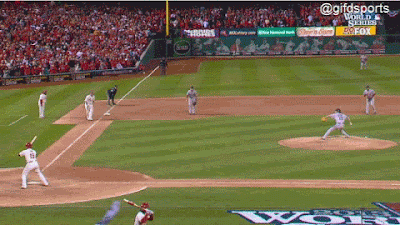
“Pedroia…makes the play…throw home, two out, over to third, it gets away, Allen Craaaiiiig…is gonna come to the plate, here’s the throooowwww, he IS-”
Well, what is he?
In the brief and excruciating interval between Allen Craig reaching home base at the end of game three of the World Series and the obstruction call becoming clear, announcer Joe Buck didn’t know if Craig was out (sending the game to extra innings) or safe (giving St. Louis a 2-1 lead in the series). So he did something unusual: he didn’t say a thing.
For a few seconds, all that viewers heard was the cacophony of the tens of thousands at Busch Stadium. It was great.
Baseball often lends itself to such silences. Derek Jeter and Andy Pettitte pulling Mariano Rivera off the mound for the last time was all the more poignant because there were no words. The New York Times cleverly acknowledged the significance of the list of 2013 Hall of Fame inductees being empty by leaving the front page of its sports section the same.
Buck’s non-call, though, was more than letting the game speak for itself; it was also a conscious editorial decision not to speculate just to fill the air. Unlike certain broadcasters, who rush to judgment when they think that a certain law has been struck down, or a certain bomber has been arrested, Buck waited for confirmation before he made the call.
Arguments over errors that occur in real-time reporting are timeless and endless, and while mistakes will always happen—particularly in live sporting events—there’s no harm in acknowledging that what you don’t know is more important than what you do know. For a few seconds on Saturday night, Joe Buck did just that. Like ruling obstruction on Middlebrooks, it was the right call.
Remember to follow the Review and its masthead on Twitter.
About the author
Simon Bredin was the Spring 2015 chief copy editor of the RRJ.
